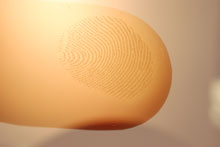
Research by Ackerman, Nocera, and Bargh featured in Wired, Discover, Boston Observer, and NPR.
Sitting in a hard chair can literally turn someone into a hardass. Holding a heavy clipboard leads to weighty decisions. Rubbing rough surfaces makes us prickly. So found researchers studying the interaction between physical touch and social cognition. The experiments included would-be car buyers who, when seated in a cushy chair, were less likely to drive a stiff bargain. The findings don’t just suggest tricks for salesman, but may illuminate how our brains develop.
“The way people understand the world is through physical experiences. The first sense they develop is touch,” said study co-author Josh Ackerman, a Massachusetts Institute of Technology psychologist. As they grow up, those physical experiences shape how people conceptualize abstract, social experience, he said. “Later on, you can do what we did–trigger different physical experiences, and produce changes in people’s thoughts.”
Published June 24 in Science, the study is the latest addition to a booming field of embodied cognition, which over the last decade has scientifically eroded the notion that mind and body are distinctly separate.
The paper was co-authored by Yale University psychologist John Bargh. His group is especially interested in touch, which is one of the first senses to develop.
